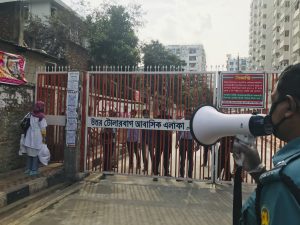Bangladesh deployed soldiers and police on Thursday to enforce the start of a nationwide 10-day shutdown to slow the spread of the coronavirus in the densely populated country.
The government also canceled all state programs, including parades, to celebrate the country’s Independence Day on Thursday.
The army said 290 teams of soldiers fanned out across the country to enforce the shutdown.
In Dhaka, a city of more than 10 million people, streets were empty and malls and roadside shops were closed. Only essential services such as vegetable markets and drug stores were allowed to operate.
TV stations showed security officials swinging batons to stop some pedestrians and people in rickshaws who were violating the shutdown.
The government has canceled all domestic flights and other transportation, including river ferries, until April 4. International flights are limited to London and Bangkok.
In thousands of villages across the country, shops and roadside tea stalls were closed.
Meerjady Sabrina Flora, director of the Institute of Epidemiology, Disease Control and Research, said five more cases of the virus were confirmed, bringing the country’s total to 44, including five deaths.
She said officials were trying to increase the number of testing facilities across the country amid criticism that the government had not prepared an adequate number of test kits for suspected cases.
Over the past two days, thousands of people have left Dhaka for their home villages across the country after the government announced the 10-day shutdown.
Flora said those who left Dhaka must stay at home in their villages to contain the spread of the virus.
Experts say Bangladesh, a nation of 160 million people, is at high risk of increased infections because hundreds of thousands of overseas Bangladeshi workers have returned home in recent weeks from Italy and other virus-affected nations. Many ignored government requests to stay at home after their return and attended social gatherings.
While most streets were empty Thursday, some volunteers roamed the capital to distribute free food.
Kadir Koushik, a director of the ARK Pullover Ltd. garment factory, was one of them. He expressed concern for the pandemic’s effect on low-income people and the economy.
“We as a privileged class understand that this country is in huge trouble,” he said. “The impact of this has still not been felt. But in the upcoming days, we’re going to understand that a huge crisis is coming.”
The coronavirus is rapidly spreading throughout much of South Asia.
By Julhas Alam for the Associated Press. Additional reporting by The Diplomat.

































